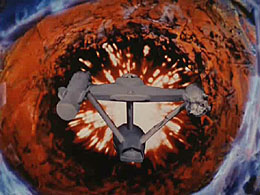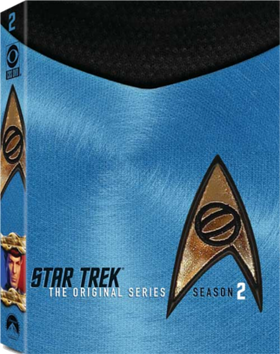
Nyota Uhura, or simply Uhura, is a fictional character in the Star Trek franchise. In the original television series, the character was portrayed by Nichelle Nichols, who reprised the role for the first six Star Trek feature films. A younger Uhura is portrayed by Celia Rose Gooding in the 2022 prequel series Star Trek: Strange New Worlds, while an alternate timeline version of Uhura has been portrayed by actress Zoe Saldaña in the feature films Star Trek (2009), Star Trek Into Darkness (2013), and Star Trek Beyond (2016).

Hikaru Kato Sulu is a fictional character in the Star Trek media franchise. A member of the crew in the original Star Trek series, Sulu also appears in the animated Star Trek series, in the first six Star Trek movies, in one episode of Star Trek: Voyager, and in several books, comics, and video games. Originally known simply as "Sulu", his first name, "Hikaru", appeared in a 1981 novel well over a decade after the original series had ended.
"Mirror, Mirror" is the fourth episode of the second season of the American science fiction television series Star Trek. Written by Jerome Bixby and directed by Marc Daniels, it was first broadcast on October 6, 1967.

"Where No Man Has Gone Before" is the third episode of the first season of the American science-fiction television series Star Trek. Written by Samuel A. Peeples and directed by James Goldstone, it first aired on September 22, 1966.

Christine Chapel is a fictional character who appears in all three seasons of the American science fiction television series Star Trek: The Original Series, as well as Star Trek: The Animated Series and the films Star Trek: The Motion Picture and Star Trek IV: The Voyage Home. Portrayed by Majel Barrett, she was the ship's nurse on board the Starfleet starship USS Enterprise. A younger version of Chapel appears in the 2022 series Star Trek: Strange New Worlds, portrayed by Jess Bush.

"Amok Time" is the second season premiere episode of the American science fiction television series Star Trek. Written by science fiction author Theodore Sturgeon, scored by Gerald Fried, and directed by Joseph Pevney, it first aired on September 15, 1967.

"Spock's Brain" is the third season premiere episode of the American science fiction television series Star Trek. Written by Gene L. Coon and directed by Marc Daniels, it was first broadcast on September 20, 1968.

"Journey to Babel" is the tenth episode of the second season of the American science fiction television series Star Trek. Written by D. C. Fontana and directed by Joseph Pevney, it was first broadcast on November 17, 1967.

"The Doomsday Machine" is the sixth episode of the second season of the American science fiction television series Star Trek. Written by Norman Spinrad and directed by Marc Daniels, it was first broadcast on October 20, 1967.

"This Side of Paradise" is the twenty-fourth episode of the first season of the American science fiction television series Star Trek. Written by D. C. Fontana and Jerry Sohl and directed by Ralph Senensky, it was first broadcast on March 2, 1967.
"Charlie X" is the second episode of the first season of the American science fiction television series Star Trek. Written by Dorothy C. Fontana from a story by Gene Roddenberry, and directed by Lawrence Dobkin, it first aired on September 15, 1966.
"The Squire of Gothos" is the 17th episode of the first season of the American science-fiction television series, Star Trek. Written by Paul Schneider, and directed by Don McDougall, it first aired on January 12, 1967.
"I, Mudd" is the eighth episode of the second season of the American science fiction television series Star Trek. Written by Stephen Kandel and directed by Marc Daniels, it was first broadcast on November 3, 1967.
"The Immunity Syndrome" is the eighteenth episode of the second season of the American science fiction television series Star Trek. Written by Robert Sabaroff and directed by Joseph Pevney, it was first broadcast on January 19, 1968.
"Plato's Stepchildren" is the tenth episode of the third season of the American science fiction television series Star Trek. Written by Meyer Dolinsky and directed by David Alexander, it was first broadcast on November 22, 1968.
"And the Children Shall Lead" is the fourth episode of the third season of the American science fiction television series Star Trek. Written by Edward J. Lakso and directed by Marvin Chomsky, it was first broadcast on October 11, 1968.
"Day of the Dove" is the seventh episode of the third season of the American science fiction television series Star Trek. Written by Jerome Bixby and directed by Marvin Chomsky, it was first broadcast November 1, 1968.
"Turnabout Intruder" is the twenty-fourth and final episode of the third season of the American science fiction television series Star Trek. Written by Arthur H. Singer and directed by Herb Wallerstein, it was first broadcast on June 3, 1969.
"Once Upon a Planet" is the ninth episode of the first season of the American animated science fiction television series Star Trek. It first aired in the NBC Saturday morning lineup on November 3, 1973, and was written by American television writers Chuck Menville and Len Janson.

The second season of the American science fiction television series Star Trek, premiered on NBC on September 15, 1967 and concluded on March 29, 1968. It consisted of twenty-six episodes. It features William Shatner as Captain James T. Kirk, Leonard Nimoy as Spock and DeForest Kelley as Leonard McCoy.










